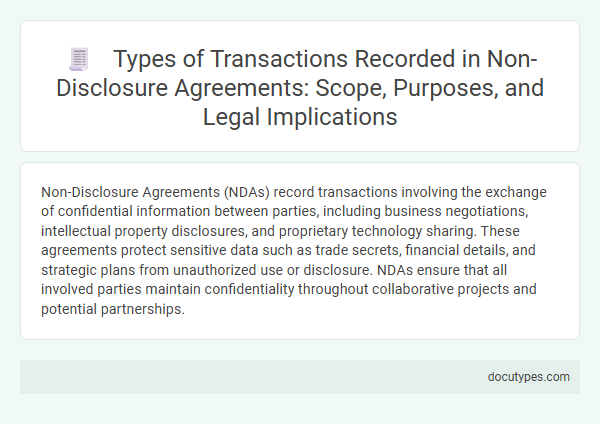Non-Disclosure Agreements (NDAs) record transactions involving the exchange of confidential information between parties, including business negotiations, intellectual property disclosures, and proprietary technology sharing. These agreements protect sensitive data such as trade secrets, financial details, and strategic plans from unauthorized use or disclosure. NDAs ensure that all involved parties maintain confidentiality throughout collaborative projects and potential partnerships.
Introduction to Non-Disclosure Agreements (NDAs)
Non-Disclosure Agreements (NDAs) protect sensitive information shared between parties during business transactions. These agreements establish confidentiality obligations to prevent unauthorized disclosure.
- Business negotiations - NDAs document confidential discussions related to potential partnerships, mergers, or acquisitions.
- Trade secrets exchange - NDAs safeguard proprietary formulas, processes, or inventions disclosed between companies or individuals.
- Product development - NDAs protect unpublished designs, technical specifications, and research data shared during collaborative projects.
Defining Transaction Types in NDAs
Non-Disclosure Agreements (NDAs) document various types of transactions to protect confidential information shared between parties. These transactions typically involve business dealings, intellectual property exchanges, and strategic collaborations.
Defining transaction types in NDAs ensures clarity about what information remains confidential throughout the agreement. Common transactions recorded include mergers and acquisitions, joint ventures, product development, and licensing deals. Your NDA might also cover financial data, customer lists, or proprietary technologies relevant to these interactions.
Sale of Business and M&A Transactions
| Type of Transaction | Description | Relevance in Non-Disclosure Agreements |
|---|---|---|
| Sale of Business | Transfer of ownership or assets of a business entity from one party to another. | Critical details about the business operations, financials, and intellectual property are protected under the NDA to prevent unauthorized disclosure during negotiations. |
| Mergers and Acquisitions (M&A) | Consolidation of companies or assets through mergers, acquisitions, or similar financial transactions. | Confidential financial data, strategic plans, and proprietary information are recorded to safeguard all parties' interests and maintain competitive advantage. |
Your sensitive information related to these transactions is secured, ensuring trust and compliance throughout the negotiation process.
Joint Ventures and Strategic Partnerships
Non-Disclosure Agreements (NDAs) frequently document transactions related to Joint Ventures and Strategic Partnerships to protect proprietary information. These agreements ensure confidentiality during the exchange of sensitive data between collaborating entities.
- Joint Venture Formation - NDAs record the sharing of business plans, financial forecasts, and intellectual property during the establishment of joint ventures.
- Strategic Partnership Negotiations - Confidential details such as market strategies and operational processes are safeguarded through NDAs in strategic partnership talks.
- Resource and Technology Sharing - NDAs specify terms for the protected exchange of technical data and resources critical to collaborative projects.
NDAs are vital for managing confidentiality risks in joint business endeavors and aligning mutual interests securely.
Licensing and Technology Transfers
Non-Disclosure Agreements (NDAs) commonly record transactions involving the licensing of intellectual property, ensuring confidential terms related to usage rights and royalties are protected. Technology transfers documented in NDAs include the exchange of proprietary methods, software, or trade secrets between parties to maintain competitive advantage. These agreements define boundaries on information sharing, preventing unauthorized disclosure during licensing negotiations and technology transfer processes.
Employment and Contractor Relationships
What types of transactions are recorded in Non-Disclosure Agreements related to employment and contractor relationships? Employment and contractor NDAs typically document the protection of confidential information exchanged during the working relationship. These agreements specifically address proprietary data, trade secrets, and sensitive business details shared between employers and employees or contractors.
Vendor and Supplier Agreements
Non-Disclosure Agreements (NDAs) commonly record transactions involving the exchange of sensitive information between vendors and suppliers. These agreements protect proprietary data, pricing details, and business strategies shared during negotiations or ongoing collaborations.
Vendor and supplier agreements documented in NDAs often include confidential terms related to product specifications, delivery schedules, and payment arrangements. You ensure that your trade secrets and competitive advantages remain secure throughout the transaction process.
Research, Development, and Innovation Projects
Non-Disclosure Agreements (NDAs) commonly record transactions related to research, development, and innovation projects to safeguard proprietary information. These agreements specifically cover confidential data exchanges, technical details, and collaborative workflows shared between parties.
NDAs document the transfer of sensitive research findings, development methodologies, and innovative concepts to prevent unauthorized disclosure. They ensure that all project participants maintain strict confidentiality regarding intellectual property and trade secrets throughout the collaboration phase.
Scope Limitations and Confidentiality Carve-outs
Non-Disclosure Agreements (NDAs) typically record transactions involving sensitive information exchange between parties. Scope limitations define the boundaries of information covered, specifying what data is protected and what is excluded. Confidentiality carve-outs identify exceptions where certain disclosures are permitted, such as information already public or independently developed.
What Types of Transactions Are Recorded in Non-Disclosure Agreements? Infographic

